
 Trace Your Delicacy
Trace Your Delicacy

 Find Canaan Locally
Find Canaan Locally
Beyond Extra Virgin
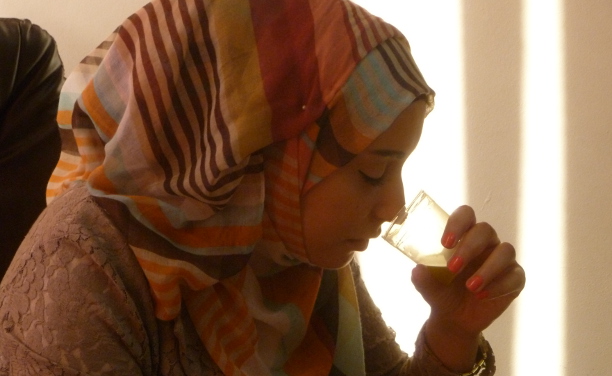



BEYOND EXTRA VIRGIN
In October 2010, the US began enforcing standards for Extra-virgin olive oil for the first time: "Extra-virgin" means the oil was extracted without the use of heat or chemicals (press remains below 86 degrees F); is pure; in a taste test, the olive oil should be free of defects and have some fruitiness or fresh olive taste. In laboratory tests EV has 0.8% acidity or less and below 20 peroxide value. Canaan Palestine Nabali and Rumi oils are below 0.7% acidity and below 10 peroxide value. Canaan Palestine olive oil is fruity and pungent with a hint of bitterness.
Only Canaan has a continuous fair trade partnership with over 2000 Palestinian farm families and 52 cooperatives, and this blossom-to-press connection means we can guarantee consistency for the highest quality olive oil every year. Canaan is investing in consistent improvement in our already delicious Palestinian Extra Virgin olive oil. Canaan staff has the sensory training (from the International Olive Council) to identify and grade olive oils, and the temperature controlled central storage capacity (500 tons!) to keep the highest quality olive oil intact and in supply year round.
Staff Training: Canaan hired a French expert from the International Olive Council (IOC) to conduct staff training on olive oil sensory analysis after the 2010 harvest. There were three one week training sessions. 20 employees were trained, with the goal of developing 5 in house tasters and 6 traveling tasters who could determine the sensory qualities of every batch of our olive oil, from our press and from the village presses. Taster Laila (above) was later judged best in the class in an all-Palestine grading seminar; she was the only woman and the only CFT representative.
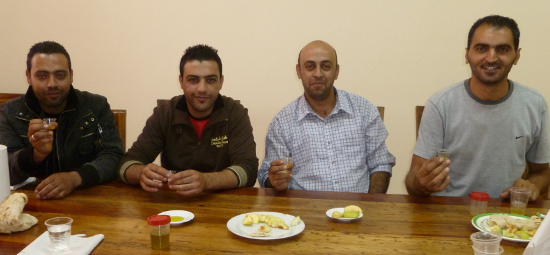
Mostafa, Ala'a, Saleh and Mahmoud (Gino) round out our in house taste team.
Picking and pressing: For EV olive oil, olives must be totally unbruised, pressed immediately, and stored in stainless steel. Olive harvest in Palestine is October and November, 'early' in the olive harvest year, before the other Mediterranean countries. Canaan's olives are picked by hand and pressed in 27 village presses. Local cooperative members press at Canaan, on our state-of-the-art Alfa Laval press in our splendid new facility in Burqin, Palestine.
In the villages, Canaan olive oil is given chemical and sensory analysis at the press by our traveling team of tasters, separated into EV and V stainless steel tanks, and a receipt is cut to pay the farmer. Our Canaan truck picks up olive oil daily from the village presses, pumping it into large segmented tanks. Shown, large EV and small V tanks in Sebastiya village (an all organic cooperative), and traveling tank at Canaan headquarters.
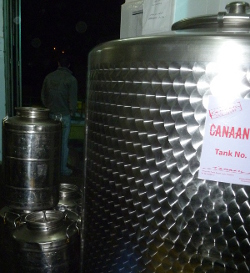
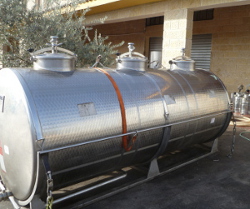
Once the olive oil arrives at Canaan, it is again given laboratory and sensory analysis and is separated into Nabali and Rumi for storage in our climate controlled facility in 20,000 liter stainless steel tanks with nitrogen fixing so no oxygen ever touches the olive oil. Canaan Nabali is mild, fruity, more sweet and buttery. Canaan Rumi is robust, fruity, pungent with a peppery finish.
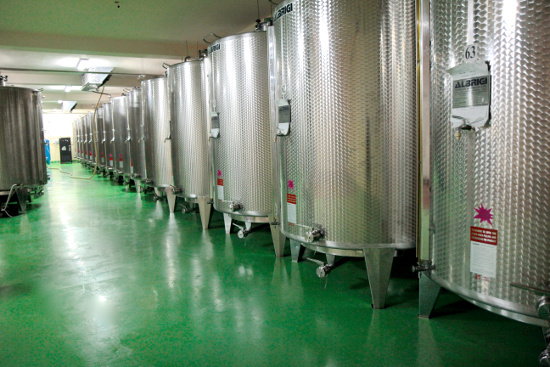
Farmer Training: Canaan has continuous long term fair trade partnerships with the 52 farm cooperatives of the Palestine Fair Trade Association. We buy their entire production, in good years and lean years, and we pay the farmers at the press. This long term relationship means we can oversee the crop over its entire life cycle, especially important as we move ‘beyond extra virgin’.
Olive Oil Definitions: Extra-virgin has a free acidity, expressed as oleic acid, of not more than 0.8 grams per 100 grams and a peroxide value of less than 20 milliequivalent O2. It must be produced entirely by mechanical means without the use of any solvents, and under temperatures that will not degrade the oil (less than 86°F, 30°C). In addition, Extra-virgin has no sensory defects.
Trained Olive oil tasters describe the positive attributes using the following terms:
-
Fruity: Having pleasant spicy fruit flavors characteristic of fresh ripe or green olives. Ripe fruit yields oils that are milder, aromatic, buttery, and floral. Green fruit yields oils that are grassy, herbaceous, bitter, and pungent. Fruitiness also varies by the variety of olive.
-
Pungent: Creating a peppery sensation in the mouth and throat.
-
Bitter: Creating a mostly pleasant acrid flavor sensation on the tongue.
Defects are:
-
Rancidity: Smells like crayons, or rancid nuts (old peanuts). Usually a greasy mouthfeel.
-
Fusty: Fermentation without oxygen prior to pressing. Smells like socks, swamp, wet compost.
-
Winey: Fermentation with oxygen. Smells like vinegar or nail polish.
-
Musty: Moldy olives, tastes like dusty, musty old clothes or basement floor.



